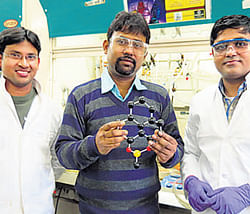In what may eventually lead to lean and thin computers packed with with more memory, scientists have developed a unique molecular memory that stores 1,000 times more data in the same storage space used in current digital device.

The revolution – when it comes to the market finally – may be something akin to an ipod, which by storing thousands of songs and large number of movies in a small space, has changed the world of personal entertainment.
If the new device finds its use in a commercial product like the ipods – or similar devices – it will be able to store 80,000 movies in the same space – possibly more than all films ever made in Hollywood. When molecular memory devices are integrated with laptops or desktops, the computers will not only be slimmer and trimmer, they will also consume less power, as they have a different way to function than current machines.
The new storage device comes from an emerging area of electronics known as spintronics (a portmanteau word combining spin and electronics) in which spin of an electron is exploited for all tasks rather than the particle’s electrical charge. “Our ultimate aim is to develop a molecular memory device that will work at room temperature and will have thousand-fold increase in storage,” Swadhin Mandal, a scientist at Indian Institute of Science, Education and Research at Mohanpur near Kolkata and one of the members of the team that created the molecular device told Deccan Herald.
Mandal and his colleagues from Massachusetts Institute of Technology, University of Gottingen in Germany and two more European institutes created a device that can transfer and store information in a molecular magnetic layer. The design – reported in “Nature” on Thursday – could pave the way for the development of molecular-scale memory devices.
“Before our work molecular devices were stable at minus 200 degrees Celsius. We have improved as our device remains stable at minus 20 degrees Celsius temperature. But the molecule requires further tailoring so that it remains stable at room temperature,” said Karthik Raman, one of the co-authors of the paper who works in IBM India Research Laboratory in Bangalore.
“This opens up a new way of tailoring the property of a molecule, which will pave the way for many superior devices. It is an important work to prove a new concept,” said P S Anil Kumar, an associate professor at Indian Institute of Science, who also works on spintronics but is not involved with this work.
